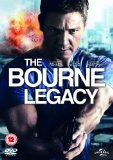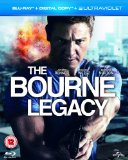 The Bourne Legacy (DVD + Digital Copy + UV Copy) | DVD | (03/12/2012)
from £6.18
| Saving you £13.81 (223.46%)
| RRP
The Bourne Legacy (DVD + Digital Copy + UV Copy) | DVD | (03/12/2012)
from £6.18
| Saving you £13.81 (223.46%)
| RRP The narrative architect behind the Bourne film series, Tony Gilroy, takes the helm in the next chapter of the hugely popular espionage franchise: The Bourne Legacy.
 The Bourne Legacy (Blu-ray + Digital Copy + UV Copy) | Blu Ray | (03/12/2012)
from £5.77
| Saving you £19.22 (333.10%)
| RRP
The Bourne Legacy (Blu-ray + Digital Copy + UV Copy) | Blu Ray | (03/12/2012)
from £5.77
| Saving you £19.22 (333.10%)
| RRP The narrative architect behind the Bourne film series, Tony Gilroy, takes the helm in the next chapter of the hugely popular espionage franchise: The Bourne Legacy.
![Jimi Hendrix Story [1973]](/pictures/1027638.jpg) Jimi Hendrix Story | DVD | (11/09/2000)
from £5.17
| Saving you £8.82 (170.60%)
| RRP
Jimi Hendrix Story | DVD | (11/09/2000)
from £5.17
| Saving you £8.82 (170.60%)
| RRP If any artist deserved a hagiography it was Hendrix, and Joe Boyd's 1973 "authorised" tribute The Jimi Hendrix Story adequately sanctifies the legend. Perversely for a documentary, it achieves this simply by well-chosen concert footage rather than through the insights of the various talking heads. Pete Townshend, Eric Clapton, Mick Jagger, Lou Reed and Germaine Greer are all wheeled out to wax lyrical about their days with Jimi--but nothing is more eloquent than watching and listening to him play. From "Hey Joe" in grainy black and white on Ready Steady Go, classic footage of Monterey, Woodstock (yes, "The Star-Spangled Banner") and the Isle of White festivals, to an acoustic 12-string rendition of "Hear My Train a' Comin'", Hendrix the musician speaks for himself. But if Hendrix the musician shines through, this is not the most insightful profile of Hendrix the man: the circumstances surrounding his death, for example, are hardly touched upon (girlfriend at the time Monika Dannemann gets only a few seconds screen time). Interview footage with Hendrix himself plus some occasionally rambling and incoherent comments from such intimates as his father, army buddies, ex-girlfriends (including Linda Keith, who "discovered" him in New York and brought him to England) and fellow musicians all take second place to the music itself. The most sensible quote comes from Little Richard, who proves once and for all that he's utterly bonkers, when he says of Jimi's music: "At times he made my big toes shoot up into my boot." On the DVD: This is a dual-layer disc, with a widescreen (1.85:1) print on one side and a standard (4:3) ratio version on the other--although watching in widescreen is redundant, as the film is shot in 4:3 anyway. There are no extras other than a theatrical trailer (despite being advertised as such a menu and scene access surely don't count as "special features": what use is a disc without them?) --Mark Walker
![Asphalt [1929]](/pictures/1011228.jpg) Asphalt | DVD | (12/04/2005)
from £28.00
| Saving you £-8.01 (N/A%)
| RRP
Asphalt | DVD | (12/04/2005)
from £28.00
| Saving you £-8.01 (N/A%)
| RRP A well-dressed lady thief (Betty Amann) steals a precious stone from a jewellery shop. The aged jeweller prefers to let the young woman go but the policeman who catches her explains he is obliged to pursue the case further. She tries to seduce the policeman (Gustav Frohlich) and he gradually succumbs to her charms but her criminal background dooms their relationship when an argument leads to murder... One of the last great German Expressionist films of the silent era Joe May's 'A
![Royal Wedding [1951]](/pictures/1013160.jpg) Royal Wedding | DVD | (05/03/2001)
from £N/A
| Saving you £N/A (N/A%)
| RRP
Royal Wedding | DVD | (05/03/2001)
from £N/A
| Saving you £N/A (N/A%)
| RRP Fred Astaire dances on the ceiling in this 1951 Alan Jay Lerner musical for MGM, directed by Stanley Donen (Singin' in the Rain). The appealing story finds Astaire as part of a brother-and-sister act (along with Jane Powell) that travels to London at the time of Queen Elizabeth II's wedding. Astaire and Powell each find romances that threaten to break up the act, but that's mostly fun window dressing in a movie better known for some truly creative sequences made vivid by Donen, including Astaire's famous dance with a hat rack and his duet with Powell, "How Could You Believe Me When I Said I Loved You (When You Know I've Been a Liar All My Life)?" --Tom Keogh, Amazon.com
![Streamers [1983]](/pictures/1081319.jpg) Streamers | DVD | (21/04/2008)
from £20.00
| Saving you £-4.01 (N/A%)
| RRP
Streamers | DVD | (21/04/2008)
from £20.00
| Saving you £-4.01 (N/A%)
| RRP Four young army men are forced to confront their prejudicial feelings shortly before being sent to Vietnam.
![The Fall [Blu-ray]](/pictures/1146985.jpg) The Fall | Blu Ray | (03/09/2018)
from £N/A
| Saving you £N/A (N/A%)
| RRP
The Fall | Blu Ray | (03/09/2018)
from £N/A
| Saving you £N/A (N/A%)
| RRP A highly personal sequel to his previous year's Tonite Let's All Make Love in London, The Fall sees British director Peter Whitehead chronicling the turbulent, world-changing events taking place in America between the autumn of 1967 and the summer of 1968. Exploring the transition from the optimism of 'flower power' to a darker more violent mood, The Fall both fictionalises and questions Whitehead's own role as a documentary filmmaker. Capturing key events of the period from anti-war protests at the Pentagon and Columbia University to the assassination of Robert Kennedy the film also features writers Arthur Miller and Paul Auster, civil rights activist Stokely Carmichael, artist Robert Rauschenberg and actress Julie Bovasso, among others; the soundtrack features original music by The Nice and soul singer PP Arnold. Considered by Whitehead to be his most significant work, The Fall is presented here in a brand-new High Definition restoration from the original film elements.
![The Fall [DVD]](/pictures/1146949.jpg) The Fall | DVD | (01/10/2018)
from £N/A
| Saving you £N/A (N/A%)
| RRP
The Fall | DVD | (01/10/2018)
from £N/A
| Saving you £N/A (N/A%)
| RRP A highly personal sequel to his previous year's Tonite Let's All Make Love in London, The Fall sees British director Peter Whitehead chronicling the turbulent, world-changing events taking place in America between the autumn of 1967 and the summer of 1968. Exploring the transition from the optimism of 'flower power' to a darker more violent mood, The Fall both fictionalises and questions Whitehead's own role as a documentary filmmaker. Capturing key events of the period from anti-war protests at the Pentagon and Columbia University to the assassination of Robert Kennedy the film also features writers Arthur Miller and Paul Auster, civil rights activist Stokely Carmichael, artist Robert Rauschenberg and actress Julie Bovasso, among others; the soundtrack features original music by The Nice and soul singer PP Arnold. Considered by Whitehead to be his most significant work, The Fall is presented here in a brand-new High Definition restoration from the original film elements.
![Fame - Series 1 And 2 [DVD]](/pictures/1097831.jpg) Fame - Series 1 And 2 | DVD | (18/01/2010)
from £20.00
| Saving you £29.99 (149.95%)
| RRP
Fame - Series 1 And 2 | DVD | (18/01/2010)
from £20.00
| Saving you £29.99 (149.95%)
| RRP Fame: Season 1 & 2 Box Set

Please wait. Loading...
This site uses cookies.
More details in our privacy policy